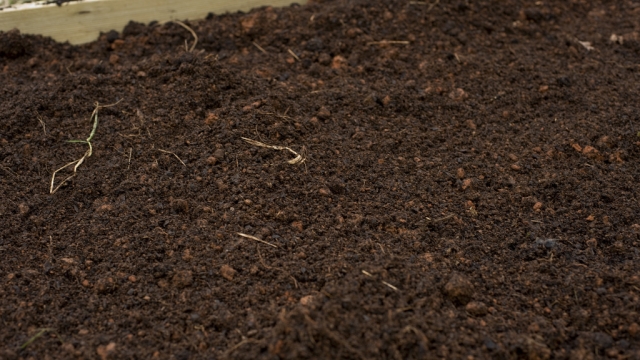From Soil to Harvest: The Organic Gardener’s Guide to Healthy Growth
Welcome to "From Soil to Harvest: The Organic Gardener’s Guide to Healthy Growth". In this article, we will explore one of the essential aspects of organic gardening: organic soils and fertilizers. As more individuals become conscientious about their impact on the environment and prioritize health-conscious lifestyles, there has been a resurgence of interest in cultivating organic gardens.
When it comes to organic gardening, the key lies in nurturing the soil. Organic soils serve as the foundation for healthy plant growth and are distinct for their ability to support a thriving ecosystem underground. Unlike conventional gardening practices that heavily rely on synthetic fertilizers, organic gardening focuses on building and maintaining the natural fertility and balance of the soil.
Organic gardeners understand that healthy soil is teeming with life. It is alive with microscopic organisms, such as bacteria, fungi, and earthworms, all working harmoniously to support plant growth. By creating a rich and diverse soil ecosystem, organic gardeners can ensure the optimal availability of nutrients necessary for plants to flourish, making the use of chemical fertilizers unnecessary.
With a solid foundation in organic soils, organic gardeners turn to organic fertilizers for additional nourishment. These fertilizers, derived from natural sources, provide plants with the essential elements they need for robust growth. By utilizing compost, animal manures, seaweed, bone meal, and various other organic materials, gardeners can enrich their soil while avoiding the potential issues associated with synthetic fertilizers, such as water pollution and soil degradation.
Throughout this article, we will delve deeper into the world of organic soils and fertilizers, exploring their benefits, methods of application, and understanding how they contribute to the overall health and sustainability of organic gardens. So, grab your shovel and join us on this journey from soil to harvest, as we uncover the secrets behind achieving bountiful, organic growth.
Understanding Organic Soil: Composition and Benefits
Organic soil is a crucial component for the success of any organic garden. Its composition and benefits play a vital role in nurturing healthy plant growth and promoting sustainable gardening practices.
Firstly, let’s delve into the composition of organic soil. Organic soil is typically made up of a rich blend of decomposed organic matter, such as compost, manure, and leaf litter. These organic materials provide essential nutrients and micronutrients that are essential for plant growth and development. Moreover, organic soil also contains a diverse range of beneficial microorganisms, including bacteria, fungi, and earthworms. These microorganisms contribute to the overall fertility and health of the soil by breaking down organic matter and improving nutrient availability for plants.

Now, let’s explore the benefits of using organic soil in your garden. One significant advantage is its ability to retain moisture. The organic matter in the soil acts like a sponge, absorbing and holding water, thus reducing the need for frequent watering. This is especially beneficial in areas prone to drought or where water conservation is a priority.
when is cucumber ready to pick
Additionally, organic soil promotes better soil structure. The presence of organic matter improves the soil’s texture, allowing for better drainage and aeration. In turn, this encourages the growth of strong and healthy root systems, which are essential for robust plant growth.
Another benefit of organic soil is its role in building long-term soil fertility. The gradual breakdown of organic matter releases nutrients slowly over time, providing a sustainable and continuous source of nourishment to plants. This is in contrast to synthetic fertilizers, which often provide a quick burst of nutrients but do not contribute to improving soil health in the long term.
In conclusion, understanding the composition and benefits of organic soil is crucial for organic gardeners. By utilizing organic soil in your own garden, you can create a thriving and sustainable environment for your plants to flourish.
Choosing the Right Organic Fertilizers
When it comes to organic gardening, selecting the appropriate fertilizers is crucial for healthy plant growth. Organic fertilizers offer a natural and sustainable approach to nurturing your soil and supporting your plants. Here are some key factors to consider when choosing the right organic fertilizers for your garden.
Firstly, it’s important to assess the specific nutrient requirements of your plants. Different plants have different needs, and understanding these requirements can help you select the most suitable organic fertilizers. Take into account the major nutrients such as nitrogen, phosphorus, and potassium, as well as secondary nutrients like calcium and magnesium.
Secondly, consider the source of the organic fertilizer. Look for products that are derived from natural substances such as compost, animal manures, and plant-based materials. These types of fertilizers release nutrients slowly and provide a steady supply of organic matter to the soil, improving its structure and fertility over time.
Lastly, check for certification or labeling that indicates the fertilizer meets organic standards. Look for products that are certified by reputable organizations, as this ensures that they have gone through rigorous testing and adhere to organic practices. Organic fertilizers that are certified will not contain synthetic chemicals or genetically modified organisms, giving you the peace of mind that you are maintaining an organic and environmentally-friendly garden.
By taking into consideration the nutrient requirements of your plants, the source of the fertilizer, and ensuring its organic certification, you can make informed choices when selecting the right organic fertilizers for your garden. Remember, a well-nourished and balanced soil will provide the foundation for healthy growth and abundant harvests.
Implementing Effective Soil and Fertilizer Management
To ensure healthy growth and abundant harvests in your organic garden, implementing effective soil and fertilizer management practices is crucial. Here’s what you need to know:
-
Organic Soil Composition: Organic soils are the foundation for successful organic gardening. They are typically rich in organic matter, such as compost, which improves soil structure, promotes nutrient retention, and enhances water drainage. In addition to compost, organic soils may contain natural materials like shredded leaves, grass clippings, and animal manure, all of which contribute to the overall fertility and health of the soil.
-
Balancing Nutrients Naturally: Organic fertilizers play a key role in providing essential nutrients to plants. Unlike synthetic fertilizers, organic options rely on natural sources for their nutrient content. Common examples include compost tea, bone meal, blood meal, and fish emulsion. These organic fertilizers release nutrients slowly, ensuring a sustained and balanced supply for plants. It’s important to understand the nutrient requirements of your specific crops and choose the appropriate organic fertilizers accordingly.
-
Building Soil Health: Effective soil and fertilizer management go beyond simply providing nutrients. It’s essential to focus on building and maintaining soil health as well. This involves techniques like crop rotation, cover cropping, and using beneficial soil amendments. Crop rotation helps prevent the buildup of pests and diseases, while cover cropping adds organic matter and improves soil structure. Incorporating beneficial soil amendments, such as mycorrhizal fungi or beneficial bacteria, can further enhance nutrient availability and plant health.
By implementing these practices, organic gardeners can create a vibrant and fertile growing environment for their plants. Remember, healthy soils are the secret to bountiful organic harvests, so prioritize soil and fertilizer management in your gardening journey.


